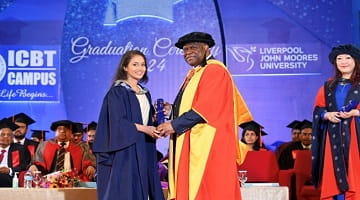Why study this course with LJMU?
- Fully accredited by the Chartered Institute of Building (CIOB) and the Chartered Association of Building Engineers (CABE)
- This programme is accredited by the Royal Chartered Institution of Surveyors (RICS)
- Part time students can study on a day release basis, making the programme ideal for those working in industry
- 6 million investment in developing state-of-the-art teaching facilities
- Stepping stone to a varied career with UK and overseas employment opportunities
- LJMU ranked 16th in the UK for construction, surveying and planning courses (The Guardian University Guide 2025)
- LJMU ranked 8th university in the UK for building degrees (The Times UK University Rankings 2025)
About your course
The professionally-accredited BSc (Hons) Construction Management at Liverpool John Moores University offers you flexible learning options plus exciting paid placement opportunities.
Additional course costs
Students are required to purchase their own site safety boots to be able to attend organised site visits. There is the option for study visits within the course which will incur additional costs. Locations may change.
Construction management is concerned with the design and construction of buildings and has become more complex as technology and the mechanisation of the building process have developed. Construction managers need excellent interpersonal skills as well as in-depth technical knowledge of all aspects of the construction process so that they can handle the responsibility of managing multi-million pound projects.
You will develop a good understanding of factors affecting the design, procurement, sustainability, and management of the building process. Particular focus is on technology, production and project management through the complete life-cycle of a project.
Course modules
What you will study on this degree
Further guidance on modules
Modules are designated core or optional in accordance with professional body requirements, as applicable, and LJMU’s Academic Framework Regulations. Whilst you are required to study core modules, optional modules provide you with an element of choice. Their availability may vary and will be subject to meeting minimum student numbers.
Where changes to modules are necessary these will be communicated as appropriate.
Core modules
Core modules
Core modules
Professional accreditation/links
Accredited by the Royal Institution of Chartered Surveyors (RICS) for the purpose of graduate membership.
Accredited by the Chartered Institute of Building (CIOB), having been judged to meet the CIOB Education Framework. Prospective members holding these qualifications have full academic exemption and may enter CIOB membership without the requirement for an Individual Assessment.
Your Learning Experience
Excellent facilities and learning resources
You can expect to spend on average 8-10 hours in timetabled activities which may be in the form of lectures, tutorials, practicals and workshops, combined with your own research using our library and the web. You should spend around 15 hours per week in private study.
Work-related Learning
Work-related learning is included within this programme, so students will have the opportunity to engage in real world projects and activities, and apply their own practical experiences.
In doing so, students will be able to apply and further develop their knowledge and employability skills in a 'world of work' context.
Having experience of the workplace and current issues is incredibly valuable in developing career aims and when applying for graduate jobs.
Work-related learning may take different forms, the most common being: work placements; internships; simulations of workplace activity; and employer-driven case studies.
The programme has active links with industry and involves employers in the industrial projects at each level of the programme. Real world case studies are used wherever possible.
Dedicated personal tutor, plus study skills support
Studying on a part time basis can be challenging. We recognise this and ensure that throughout the course you will have the support of a personal tutor who can provide one-to-one guidance and advice on course-related issues
Assessment varies depending on the modules you choose, but will usually include a combination of exams and coursework.
All students perform differently depending on the type of assessment they are asked to do, and so a variety of assessment methods are used. These include exams (open and closed book), coursework (projects, technical reports, portfolios, etc), and presentations (individual and group).
Your tutors will give prompt and constructive feedback via Canvas (our virtual learning environment), face-to-face or in writing.
This will help you to identify your strengths as well as the areas where you may need to put in more work.
Where you will study
This programme is delivered in the Byrom Street complex of LJMUs City Campus. Here you'll find high quality lecture theatres, meeting and seminar rooms plus social spaces and a large café. The Avril Robarts Library is just minutes away on Tithebarn Street.
Course tutors
-
 Lecturer/Senior Lecturer
Lecturer/Senior Lecturer -

-



I have been able to apply the experience and knowledge I gained during my placement year to the degree course, and most importantly I have developed contacts with professionals in the construction industry. I would definitely advise students to complete an industrial placement year, as the practical experience gained is invaluable.
Career paths
Career prospects for construction management graduates are excellent, with many students securing their first professional position working for multi-national contractors and consultancies and also for organisations within the supply chain either before or after graduation. You can work in the Public or the Private sector and will be equipped with skills to work in the building or civil engineering field and also within Facilities Management.
However, the skills that are obtained within the programme, albeit focused around construction, can be applied into other areas such as financial control and project planning and management of resources.
You can also enjoy varied career opportunities overseas in addition to the UK.
If you decide not to go into the profession, however, you can still take advantage of your transferable skills and work experience to enter other careers.
Student Futures - Careers, Employability and Enterprise Service
A wide range of opportunities and support is available to you, within and beyond your course, to ensure our students experience a transformation in their career trajectory. Every undergraduate curriculum includes Future Focus during Level 4, an e-learning resource and workshop designed to help you to develop your talents, passion and purpose.
Every student has access to Careers Zone 24/7, LJMU's suite of online Apps, resources and jobs board via the LJMU Student Futures website.
Tuition fees and funding
- Part-time per year:
- £7,145
The University reserves the right to increase tuition fees in accordance with any changes to the maximum allowable fees set by the UK Parliament. In the event of such a change, any fee increase will be subject to a maximum cap of 10% of the total course cost as originally stated at the time of your offer.
The fees quoted above cover registration, tuition, supervision, assessment and examinations as well as:
- library membership with access to printed, multimedia and digital resources
- access to programme-appropriate software
- library and student IT support
- free on-campus wifi via eduroam
Additional costs
Although not all of the following are compulsory/relevant, you should keep in mind the costs of:
- accommodation and living expenditure
- books (should you wish to have your own copies)
- printing, photocopying and stationery
- PC/laptop (should you prefer to purchase your own for independent study and online learning activities)
- mobile phone/tablet (to access online services)
- field trips (travel and activity costs)
- placements (travel expenses and living costs)
- student visas (international students only)
- study abroad opportunities (travel costs, accommodation, visas and immunisations)
- academic conferences (travel costs)
- professional-body membership
- graduation (gown hire etc)
Funding
There are many ways to fund study for home and international students. From loans to International Scholarships and subject-specific funding, you'll find all of the information you need on our specialist funding pages.
Entry requirements
Please choose your qualifications below to view requirements
Grades/points required from qualifications: BCC-BBB (104-120)
Work out how many UCAS points your qualifications are worth by visiting the UCAS Tariff Calculator.
Qualification requirements
How to apply
Securing your place at LJMU
To apply for this programme, you are required to complete an LJMU online application. You will need to provide details of previous qualifications and a personal statement outlining why you wish to study this programme.
Your university life
From accommodation and academic support to clubs and societies. Find out what LJMU has to offer.
Related Links
Talk to our students
Connect with a current LJMU student for advice and guidance on university life, courses and more.
See what our students are saying
At LJMU we want you to know you're making the right choice by studying with us. You can see what our students are saying about their experience with us through their reviews on the following websites:
Related Links
News and views
Browse through the latest news and stories from the university
The university reserves the right to withdraw or make alterations to a course and facilities if necessary; this may be because such changes are deemed to be beneficial to students, are minor in nature and unlikely to impact negatively upon students or become necessary due to circumstances beyond the control of the university. Where this does happen, the university operates a policy of consultation, advice and support to all enrolled students affected by the proposed change to their course or module.
Further information on the terms and conditions of any offer made, our admissions policy and the complaints and appeals process.



























